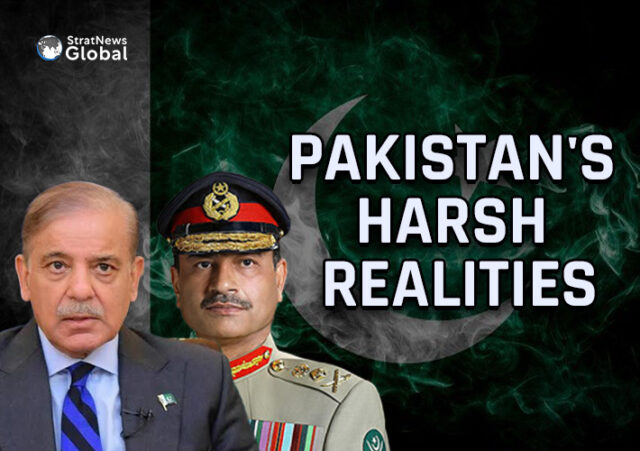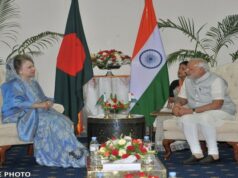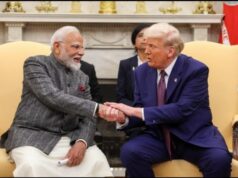Pakistan’s problems in a nutshell: “I think the establishment has thus far always been able to succeed in having its own will prevail. And it seems that this time, too, they have been successful, although there is a large mass support for Imran Khan, I don’t think they are in a position to launch a nationwide movement to challenge the establishment and the current government. The problems of Pakistan are that whichever government is in power, it has to face the harsh reality of a huge debt under which Pakistan is crushed. And we don’t have an industrial sector which is functioning well. The agrarian sector is stagnant. There are no jobs, the bazaars are empty, the shops are in a poor condition. So there is a sense of despair, despondency.”
Prof Ishtiaq Ahmed, Emeritus Professor of Political Science at Stockholm University, was talking on The Gist show over the weekend. In his view, the politicians are not helping, noting that in his first speech as prime minister, Shahbaz Sharif said that by 2030, he was hoping that Pakistan would be a member of the G20. Neither Shahbaz nor the army have any concrete ideas how to get out of the economic mess which has accumulated over the years, he pointed out.
“You can’t manage an economy if you sort of subordinate everything to a perceived threat to Pakistan’s existence from primarily India. So spending money on arms and the arms race has been devastating for Pakistan, something comparable to how the Soviet Union ultimately went bankrupt because of the arms race. And I think at the moment, I don’t think whatever ideas they have, they are very cogent and they are very concrete.”
Dr Ahmed does not envisage a collapse of the kind that the USSR witnessed. Interestingly enough, the collapse was a decision of the Communist Party of the Soviet Union, whereas the republics didn’t want to get out of the Soviet Union. But Pakistan’s situation is very different since the Baloch want to secede from Pakistan. There is an emerging threat from Khyber Pakhtunkhwa in the tribal areas where there is a desire to break out of Pakistan.
“What is left then is Sind which has always had a grievance against Pakistan. It’s only in the Punjab, which is the support base of the Pakistani state. But the Pakistan army at the present moment, if there is no intervention by a great power, I think it has the capacity and capability of keeping at bay the Baluch, as well as the people in the Frontier,” he said.
The low scale insurgency in Balochistan and the Frontier may continue for a long time, but Prof Ahmed believes the Pakistan army will hold its own. How long is not clear because ultimately, Pakistan is bankrupt and nobody is bailing them out, the Americans used to. And the Saudis used to do. Probably the Chinese have a stake in maintaining Pakistan, he noted.
But he believes that Pakistan must make radical changes in its orientation in the region, Pakistan needs to normalize relations with India, start some sort of trade, allow books and medicines.
“I remember way back in 2004 when Imran Khan was just a rising politician, he was in Karachi trying to build another cancer hospital. And I think Amir Khan, this Bollywood actor, was there. I remember Imran Khan saying that, you know, there is a cancer pill which if we buy from the West as we do, it costs ₹61. But if you buy it from India, it’s only ₹52. So you can see the great advantage Pakistani people would derive in a normalization with relations with India. And that’s what I’m arguing all the time. And I hope Pakistani policymakers power wielders, they start listening to me. I’m not the only one. Of course, there are other very sane voices being raised in Pakistan, but this whole notion of first settling the Kashmir dispute and that also the way Pakistan wants it, that will not provide a breakthrough.”
What makes the Pakistan Army so different from its protege the Bangladesh Army? I think in Bangladesh, they realized that good relations with India is good for Bangladesh. I think some of those generals who were involved in the assassination of Mujibur Rahman, were hanged, so that group was smashed and the new Bangladesh army is the way armies should be. They should be there to defend the national borders, but leave the politicians to manage internal affairs. Pakistan, from day one, never had this opportunity. Mr. Jinnah, before Pakistan came into being, was marketing Pakistan to the West. That we would join the anti-Communist, anti-Russian, anti-Soviet containment policy.
“And that is Pakistan’s problem,” Prof Ahmed says, “that the amount of economic and military aid which came only strengthened one institution in Pakistan. And once Mr Jinnah was gone, things started going awry and they never could stabilize. So we have never had a leader like Jawaharlal Nehru or a home minister like Sardar Patel, during the formative years. It’s when the state has been formed that you need people with a vision and a commitment. We had this tragedy of not having any such people around. And over time that has only worsened.”
Prof Ahmed recalled his book Pakistan the Garrison State published over a decade ago. “When I talk to retired generals and former heads of the ISI, they feel that without them Pakistan won’t last because the politicians are rotten. This is a common trait they all share. And I think this is even taught to them. And they are not far from the truth in many cases, but I don’t think they understand that for Pakistan to stabilize and to grow in a robust manner, good relations with India is a prerequisite.”
But India wouldn’t want a state which is always exporting terrorism. So if one does away with this sort of politics, both can live in peace and be good neighbors. And if there is any aggressive power trying to destabilize Pakistan, they have nuclear weapons. So what’s the big deal? Just be a normal state under international law, interference in the affairs of other countries is illegal. It’s unlawful. And sending mujahideen has to be abandoned, not tactically, but intellectually, he noted.
“I was there for nine weeks, addressing 27 public audiences, universities, think tanks and so on. And everywhere my ideas were received in a very sympathetic manner.”
“Nobody was outright challenging me. There were some rude remarks here and there, but that’s obviously bound to happen, and the dreaded ISI did nothing to obstruct me. I went everywhere, even to the Civil Service Academy, where all the bureaucrats are trained. And believe me, I made them clap when I told them of Mahatma Gandhi’s services to Muslims during partition.”
I want Pakistan to be like India, growing, he said. “I see India not with envy, but with a lot of admiration. In 10 or 20 years India is definitely going to be a great power. In India, whatever leadership you have, the national interest is never compromised. And I think that’s important. In Pakistan. The governments are like a monster not knowing if it will be in power tomorrow, so use public office to amass private wealth.”
Prof Ahmed says there are some people who tell him that negotiations are going on with Imran Khan and if they can reach an understanding, maybe a way to bring him back could be possible. But most others say Imran Khan has no chance, and they would try to ensure that Shahbaz Sharif continues.
“I would have preferred Mian Nawaz Sharif, who is more outspoken about good relations with India. I think the establishment will be trying to promote Bilawal Bhutto but he is a Sindhi and without a Punjabi being part of the team, it’s not possible. Both realize that security wise, trade wise and so on, good relations between India and Pakistan are a better guarantee of a bright future than if there is a disturbance all the time.”
Thirty eight years in journalism, widely travelled, history buff with a preference for Old Monk Rum. Current interest/focus spans China, Technology and Trade. Recent reads: Steven Colls Directorate S and Alexander Frater's Chasing the Monsoon. Netflix/Prime video junkie. Loves animal videos on Facebook. Reluctant tweeter.





